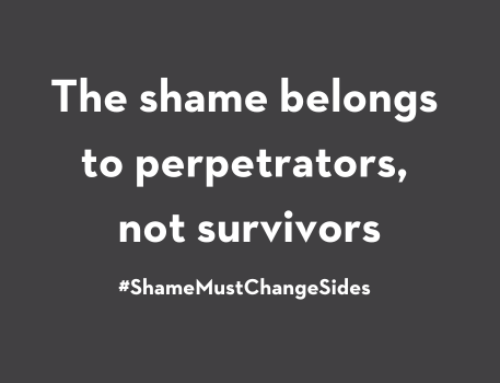
Imagine if most people who got behind the wheel of a car didn't understand the rules of the road.
There would be chaos on the highways and accidents at every corner. People would get hurt. It wouldn't take long for the public to insist something be done to educate drivers.
So why do we accept the same lack of knowledge when it comes to consent for sexual activity?
A new study from the Canadian Women's Foundation found that while almost all Canadians (96 per cent) agree that sexual activity between partners should be consensual, two-thirds (67 per cent) do not understand what consent means.
That means only 33 per cent of people in Canada know consent must be positive and ongoing.
Positive consent means people show they agree to a sexual activity through what they say and do, and ongoing consent means they continue to show their willingness throughout the sexual activity.
Ongoing consent is essential because consent for one thing is not consent for everything. Just because someone agrees to a kiss doesn't mean they agree to sexual intercourse. Just because they agreed to have sex yesterday does not mean they agree to have sex today. And just because they agree to start something doesn't mean they can't change their mind and decide to stop.
Most people instinctively check for positive verbal and behavioural cues from their sexual partner, and stop if they are unwilling.
If you can't tell if someone is consenting, ask: "Are you okay with this?" Encourage them to answer honestly. Decent people treat others with respect, especially when it comes to something as intimate as sexual activity. Sexual activity without consent is sexual assault. It's all pretty simple.
So why are so many Canadians confused about consent?
I think there are two main reasons:
1. Silence
Until recently consent hasn't been discussed very much, so many people don't understand it. Most of us haven't had a chance to ask questions and arrive at our own practical understanding.
Maybe we've been silent because we aren't comfortable talking about sex, or because we think it will "ruin the romance" (although unwanted sex is pretty darned unromantic).
Some people might not want to raise the issue of consent because they're afraid of rejection. What if you ask for consent and the answer is no? There's no doubt that would feel terrible. But it's better than the alternative: having sex with someone who doesn't want to. For anyone with an ounce of empathy, that would be truly awful.
Some people worry that talking about consent might encourage young people to be sexually active, but it could just as likely empower them to say "No."
Creating a culture of consent means people feel equally comfortable saying "Yes" or "No" to sexual activity. It also means their answer — whatever it is — is heard and respected.
Abuse thrives in silence. Each year, there are an estimated 460,000 sexual assaults in Canada. We need to talk about why sexual assault is so common and education about consent is an important part of that conversation.
2. Sexism
Expecting consent for sexual activity can make people uncomfortable or defensive because it challenges gender roles and helps to equalize sexual power.
Despite so much progress on women's equality, some people still have a strong double standard when it comes to sex. They still think "real" men should aggressively pursue sex and "good" women should resist (and eventually give in). According to this worldview, the need that you need permission to have sex is ridiculous.
People who argue against the need for consent seem to be outraged at the idea that a woman's "No" should be respected. Chances are, they're also the first to call a woman a slut if she dares to openly enjoy sex.
If you scratch beneath the surface of their arguments, you'll often find a few predictable tactics.
First they try the straw man approach of distorting the argument and then mocking the distortion, such as claiming: "Everyone will have to sign a contract before they kiss someone!" Obviously, checking for consent will not include filing paperwork.
Another popular tactic is to fixate on drinking. Under the law, someone who is incapacitated cannot legally give consent, so they ask questions like: "What if both people are drunk? Are they raping each other?" Don't worry, folks, having sex after a few drinks is perfectly fine. Of course, that's assuming both people have positively consented and neither of them are incapacitated — in other words, no one is having trouble walking, slurring their speech, throwing up, or passed out. If they are: sorry, no consent.
They also try to scare men into believing they'll be accused of rape at every turn. Guys, as long as you have not forced your partner to drink alcohol, slipped them drugs, or are using coercion, threats, intimidation, blackmail, or physical force, you have nothing to worry about.
The most arrogant commentators come right out and say: "If I had to stop and ask permission, I'd never get laid." This attitude is especially troubling when you remember that sex without consent is sexual assault.
All of this mockery reminds me of when Margaret Mitchell was laughed at by male Members of Parliament for talking about domestic violence in the House of Commons in 1983. At the time, she was one of the first politicians to raise the issue publicly, and several MPs thought it was hilarious. One openly joked: "I don't beat my wife. Do you, George?"
Those who laugh at the idea of consent are really saying: "I don't care what the other person wants, I only care about what I want." It's the same entitled, sexist thinking behind sayings like: "No means Yes" and "Maybe means Yes."
Only yes means yes.
Here's the good news: people are finally starting to talk about consent. There are now some terrific videos and articles that are helping to explain consent in an accessible, even lighthearted way.
Consent isn't complicated. Consent is positive, ongoing permission. If you aren't sure, ask. At the end of the day, it's about communication and respect.
For the past 15 years, the Canadian Women's Foundation has been investing in violence prevention programs that include teaching teens about consent and healthy relationships.







